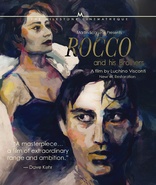Rocco and His Brothers Blu-ray Movie
HomeRocco and His Brothers Blu-ray Movie 
Rocco e i suoi fratelliMilestone | 1960 | 179 min | Not rated | Jul 10, 2018
Movie rating
8 | / 10 |
Blu-ray rating
| Users | 0.0 | |
| Reviewer | 4.5 | |
| Overall | 4.5 |
Overview
Rocco and His Brothers (1960)
Having recently been uprooted to Milan, Rocco and his four brothers each look for a new way in life when a prostitute comes between Rocco and his brother Simone.
Starring: Alain Delon, Renato Salvatori, Annie Girardot, Katina Paxinou, Alessandra PanaroDirector: Luchino Visconti
| Foreign | Uncertain |
| Drama | Uncertain |
| Crime | Uncertain |
| Sport | Uncertain |
Specifications
Video
Video codec: MPEG-4 AVC
Video resolution: 1080p
Aspect ratio: 1.85:1
Original aspect ratio: 1.85:1
Audio
Italian: LPCM 2.0
Subtitles
English
Discs
Blu-ray Disc
Two-disc set (2 BDs)
Playback
Region A (B, C untested)
Review
Rating summary
| Movie | 5.0 | |
| Video | 4.0 | |
| Audio | 4.0 | |
| Extras | 2.5 | |
| Overall | 4.5 |
Rocco and His Brothers Blu-ray Movie Review
Reviewed by Jeffrey Kauffman July 10, 2018One of the interesting analyses made by Linda Ehrlich on her commentary track for Maborosi, another iconic foreign film also released on Blu-ray by Milestone Films, is how dialects tend to differentiate characters, even adding a subliminal element of isolation at times. It’s an aspect to the story which frankly probably isn’t immediately apparent, even subliminally, to many Western audience members without an intimate knowledge of the intricate ins and outs of Japanese. While my hunch is there are most probably more relatively competent Western speakers of Italian than of Japanese, my simultaneous hunch is that even some of those folks may be unaware that there is a similar aspect of regional idioms and accents that plays into Rocco and His Brothers, a film which is probably even more iconic than Hirokazu Kore-eda’s 1995 opus. If there’s at least a hint or two of magic realism running through the Kore-eda film, Luchino Visconti’s Rocco and His Brothers is probably better appreciated as stemming from the neorealist tradition, a genre that Visconti both helped to create and also wasn’t shy from avoiding at various points in his long if not overly productive career (in terms of actual number of feature films). It’s therefore kind of interesting to compare and contrast the rather wide gamut of styles Visconti exploited over his many decades of filmmaking, with some films like Ossessione falling squarely within the neorealist idiom (some people aver that Ossessione actually jump started the neorealist movement), and some of Visconti’s other offerings, like The Leopard and Death in Venice, probably too glossy and even epic to comfortably reside within the neorealist parameters. But 1960, the year of Rocco and His Brothers' original theatrical release, may strike some film historians as a bit "late" for a true neorealist outing, while at the same time that same year might similarly seem a bit too "early" for those well versed in Visconti's more genre defying (and at times considerably more opaque) offerings where some stylistic flourishes well outside of neorealist tradition were seen, some of which are occasionally hinted at in this film and which may in fact separate it from being a "true" neorealist outing.
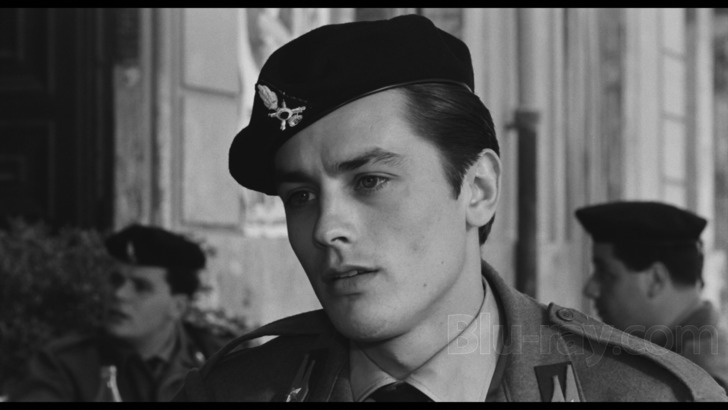
Kind of interestingly for a film which seems so unavoidably steeped in Italian traditions, Rocco and His Brothers features two French stars, Alain Delon as Rocco Parondi and Annie Girardot as Nadia, a “working girl” who figures as the linchpin of sorts in what amounts to a ménage à trois (however unintended it may be) which also involves Rocco’s brother Simone (Renato Salvatore). One of the outstanding stars of Greek cinema who also managed to matriculate (if fitfully) to Hollywood, Katina Paxinou, plays Rosaria, the mother of the five Parondi brothers, with all of the family members moving to Milan from rural southern Italy as the film opens. (Film history buffs may recall that Paxinou won the Academy Award for Best Supporting Actress for her work in For Whom the Bell Tolls.) Also kind of interestingly for those who know Visconti’s early work, one of the supplements included on this two disc release from Milestone is a lengthy interview with Caterina d’Amico, daughter of Suso Cecchi d’Amico, who relates that Rocco and His Brothers is a kinda sorta sequel to Visconti’s 1948 drama The Earth Trembles, in that the source novel for that film, Giovanni Verga's I Malavoglia contains a subplot featuring five fishermen who attempt to move from a village to the “big city”. This attribution of source material is somewhat different from both the credits of the film, which lists Giovanni Testori's Il ponte della Ghisolfa as the source, and none other than Martin Scorsese, who offers a number of different sources in his introduction to the film included on this Blu-ray, sources which include Dostoevsky's The Idiot.
Rocco and His Brothers has an interesting structure which tends to support both a vignette driven expositional style and an overall narrative arc that bridges separate sections which tend to offer different character perspectives on some of the same situations. There are family dynamics aplenty in this film, including what might be termed “territorial skirmishes” between mama Rosaria and her ultimate daughter-in-law Ginetta (Claudia Cardinale), first seen as the fiancée of eldest Parondi brother Vincenzo (Spiros Focás). Vincenzo has already made the journey to Milan and more or less established himself, and Rosaria and the rest of the brothers have come to move in with him as they attempt to matriculate into Milanese society.
There’s a kind of weird Odets-ian flavor to some of the proceedings in Rocco and His Brothers, including an emphasis on boxing as a way out of economic distress, but also in terms of some of the florid if often viscerally powerful dialogue. Simone in fact does take on a boxing career, something that informs some sections of the film, but the real tension here is the dynamic between Rocco, Nadia and Simone, a situation which ultimately erupts into a tragic denouement which is really interesting to view in light of Visconti’s transition from nascent neorealist to “something completely — or at least partially — different”. Without spoiling actual plot points, for those who have never seen the film (or who perhaps have and want to revisit it with “new” eyes), it’s absolutely fascinating to see how Visconti stages two showdowns which end unhappily, in one case “masking” a murderous attack while also using a quasi-montage approach that intercuts scenes of a boxing match, and in the other shooting from a distance with characters almost dwarfed by the surrounding urban blight. Even this “arm’s length” approach wasn’t enough to satisfy early censors, who removed snippets of the film (as is documented in a short but really interesting supplement included on Disc Two of this set).
If the "idiolect aspect" of the film is one of its more subtle contributions, it's really interesting to see Rocco and His Brothers as an equally subtle microcosmic treatment of more general socioeconomic trends that all of Italy was experiencing during the era of the film's production. In that regard, it's perhaps instructive to compare the climb toward middle class security that some elements of Rocco and His Brothers feature with the downtrodden lives depicted in some earlier neorealist films like Rome, Open City or (perhaps even more so) Bicycle Thieves. What Rocco and His Brothers seem to suggest is that for all the struggling to escape the confines of poverty, there are other prisons, including family relationships, which are harder to get away from.
Rocco and His Brothers Blu-ray Movie, Video Quality 
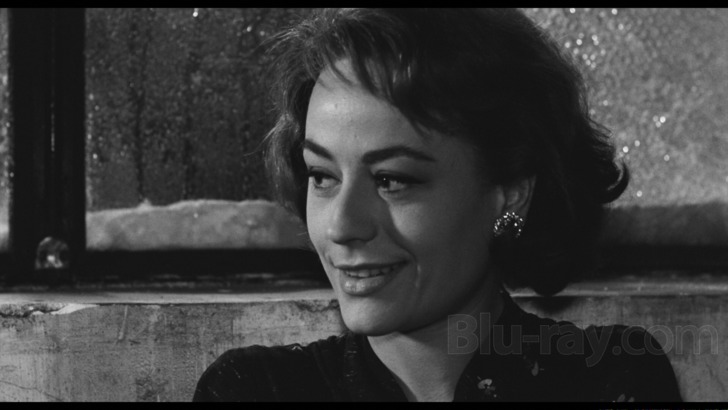
Rocco and His Brothers is presented on Blu-ray courtesy of Milestone Films with an AVC encoded 1080p transfer in 1.85:1. This is evidently culled off the same 4K restoration as the 2016 Eureka Blu-ray release distributed in the UK market, and in fact it begins with the same informational text (see screenshot 21). From some of the "before and after" snippets seen in the restoration demonstration, it's evident that at least some swaths of Rocco and His Brothers were very badly damaged, and so any niggling qualms with this restoration and its Blu-ray presentation should probably be best appreciated within that context. Detail levels are quite impressive throughout the presentation, and some close-ups offer really abundant fine detail levels. Pretty flagrant instability that is seen in the "before" moments of the restoration demonstration have been completely eliminated, and the signs of mold mentioned in the text card are also gone. There are still some passing concerns here, including a somewhat variable grain field. A lot of the presentation has a nicely organic looking and undeniably visible grain field, but it kind of comes and goes at some unusual spots — for instance, it's more than evident in the opening Titanus Films masthead, but then when the actual imagery appears under the optically printed credits, a place where one might reasonably expect it to spike, it in fact diminishes. There are also some variabilities in both contrast and black levels throughout the presentation, though nothing that I personally found overly problematic and/or distracting. My score is 4.25.
Rocco and His Brothers Blu-ray Movie, Audio Quality 
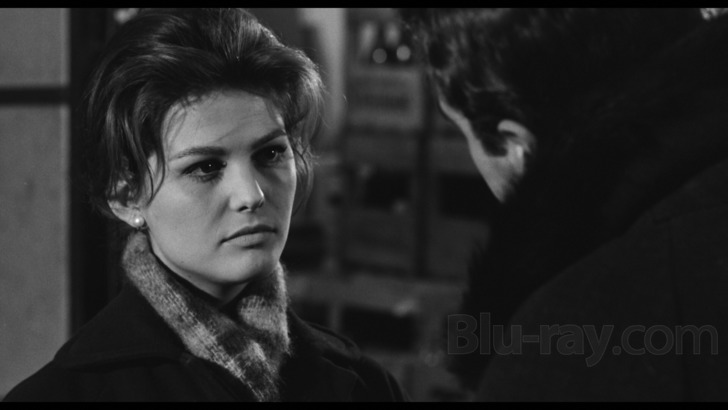
Rocco and His Brothers features an LPCM 2.0 mono mix in the original Italian (for those interested, the Eureka released linked to above also included a French dub). While a bit boxy sounding at times, especially with regard to the post-looped dialogue and some effects, overall fidelity here is fine, offering good support for Nino Rota's wonderful score. One thing that I found kind of surprising on the Outtakes section is that the film was evidently shot live with sound, even then a rarity in Italian cinema (I'm basing this on a snippet seen in the Outtakes which features not just the actors speaking, but Visconti himself shouting direction at them). As with many Italian films, sync can be almost comically loose at times, no doubt exacerbated by an international cast, all of whom may not have been fluent enough to work in Italian.
Rocco and His Brothers Blu-ray Movie, Special Features and Extras 

Disc One
- Introduction by Martin Scorsese (1080p; 2:39) begins with some snippets of the restoration process, which can be seen in their entirety on a supplement on Disc Two of this set, after which Scorsese lionizes Visconti as one of the titans of cinema while also briefly discussing some of the sources used to inform the story as well as what Scorsese describes as the "lustrous" and "pearly" black and white cinematography.
- Outtakes (1080i; 5:57) shows some of the differences various versions have had due to censorship issues through the years.
- Before and After (1080p; 2:39) shows the results of the restoration efforts, which have eliminated what looks like some pretty significant damage, including some unbelievably bad emulsion problems which I'm assuming may be the mold alluded to in the text card I've uploaded as screenshot 21. Other issues like brightness and contrast have also obviously been addressed.
- Interview with Caterina d'Amico (1080p; 41:18) is a really interesting long form interview with the daughter of Suso Cecchi d'Amico, who discusses the genesis and production of Rocco and His Brothers. This is in (pretty heavily accented) English, and might have been helped by some optional English subtitles.
- Interviews with Cast and Crew (1080p; 34:23) is a compendium of various archival interviews (some in color, some in black and white, most with some passing video and audio issues), and includes comments from Claudia Cardinale, Mario Garbuglia, Annie Girardot, Guiseppe Rotunno, Piero Tosi, and Suso Cecchi d'Amico.
Rocco and His Brothers Blu-ray Movie, Overall Score and Recommendation 
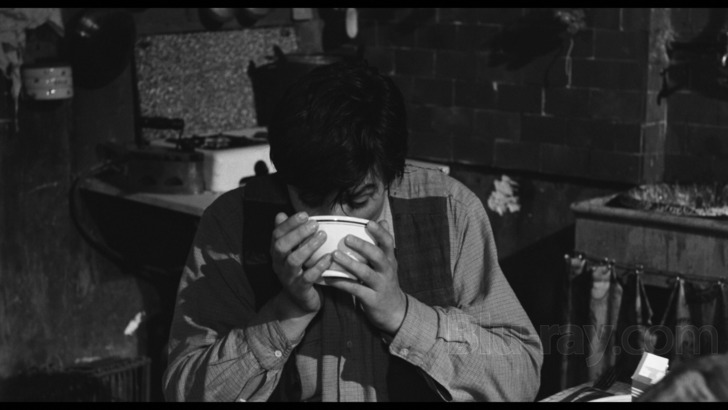
Rocco and His Brothers is an often unsettling viewing experience, seeming to peel back several scabs that have formed over the Parondi family's interrelationships, but it features an array of moving performances and a really interesting transitional style for Visconti. Milestone offers a release with solid technical merits and some very enjoyable supplements, but those with multi region players may well want to compare and contrast what the Eureka UK release has to offer. Highly recommended.
Similar titles
Similar titles you might also like

Pixote
Pixote: A Lei do Mais Fraco
1980

The Tribe
Plemya
2014

A Touch of Sin
天注定 / Tian zhu ding
2013

The Conformist
Il Conformista | 4K Restoration
1970

Bullhead
Rundskop
2011

Dragnet Girl
非常線の女
1933

Lilya 4-ever
2002

Germany Year Zero
Germania anno zero
1948

Umberto D.
1952

The Marriage of Maria Braun
Die Ehe der Maria Braun
1978

La Strada
1954

Gomorrah
Gomorra
2008

Ley Lines
1999

Rainy Dog
1997

The Night of the Shooting Stars
La notte di San Lorenzo
1982

Détective
1985

Accattone
1961

Gomorrah: Season One
Gomorra - la serie
2014

Like Someone in Love
ライク・サムワン・イン・ラブ / Raiku samuwan in rabu
2012

Beyond the Hills
După dealuri
2012
